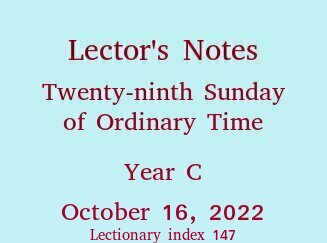

Twenty-ninth Sunday of Ordinary Time, October 19, 2025
The Israelites, only recently freed from slavery in Egypt, and still far from their promised land, meet resistance from a warlike tribe. This portrait of Moses, resolute and inspiring confidence, encouraged later generations who preserved this story.
The New Testament's "pastoral letters" are in the form of exhortations from a senior apostle to a member of the second generation of church leaders. But the letters also address the whole church. Today's passage reminds leaders and members of our sources and our priorities.
For Jesus' time and place, the two characters in today's parable were extremely unusual: an outspoken woman and a man who cared nothing about others' opinions of himself. Jesus compares us to one and contrasts the other with God our Father.
The Literature: The events that underlie the book of Exodus took place in the 13th century, B.C.E. The book as we have it now is a synthesis of several threads of tradition, created and refined over long periods. Here's a summary of John F. Craghan's treatment of Exodus as literature in The Collegeville Bible Commentary - Old Testament (Collegeville, Minnesota: 1992 (out of print, but see here for a newer edition).
It is popular literature, not scientific history, with several sources. Of the sources, Craghan says, "Given the centrality of the Exodus for Israel's faith, one should not be surprised to find a number of theologians at work. Exegetes [Bible scholars] usually point to at least three theologians in the composition of this work. The first is the Yahwist ( = J ) who writes in the tenth century B.C.E. during the heady days of the Davidic-Solomonic kingdom. The second is the Elohist ( = E ) who reflects a period of religious turmoil and syncretism in the eighth or ninth century B.C.E. The third is the Priestly Writer ( = P ) who struggles to offer a picture of hope during the debacle of the Exile in the sixth century B.C.E. It would be wrong for the reader to attempt to harmonize their sometimes conflicting views. Rather, the reader must allow such theologians the requisite freedom to interpret. Such a stance recognizes that these writers judged the past in the light of their present and with a view to the future needs of Israel."
(Ambitious readers may want to tackle this article: Hendel, Ronald. “The Exodus in Biblical Memory.” Journal of Biblical Literature 120 (2001):601-620. (Click here (link verified 10/15/2025)) for more on the literary composition of Exodus.)
Interesting to you, I hope, but not much help in getting prepared to read the passage to a Sunday assembly, is it? Ideally, we would learn what situation prompted the ancient editor to craft the passage this way. We'd have some certainty about how he applied his tradition to the needs of his people. We'd know from what aberration or temptation he was calling them back to the basics. The lector would try to take on that purposeful mind-set, perhaps with an "Aha!" recognizing similar needs in the life of the listening congregation. (So should the preacher.) But it's hard in this instance to figure out what those original needs were. Something prompted the editor to emphasize the steadfastness of Moses, and to praise Moses to the point that the Lord Yahweh is only barely mentioned. So my advice to the lector is to meditate a bit on the stature of Moses. What a daring thing he undertook with a band of slaves. How resolute he had to be in rallying them to overcome their fears. How well he knew the Lord.
Your Proclamation: This story has some vivid images that you should get across with careful phrasing and contrasts in your tone of voice. Joshua is Moses' military commander. The name of the enemy leader is pronounced "AM uh lek" with a short a in the first syllable.
Moses clearly saw his staff as an awesome thing. Let a trace of awe be heard in your voice when you say, "I will be standing on the hill with the staff of God in my hand." When you get to the sentence, "As long as Moses kept his hands up, ..." slow down so that your hearers have a chance to fix this image in their minds. Your slowing down will also help them catch the elegant but archaic phrase, "had the better of the fight."
The translator, if not the original author, certainly enjoyed turning the phrase, "And Joshua mowed down Amalek ..." You should read it aloud with a certain relish, too.
The Historical Setting: Of course, Timothy had an office in the early church that included the proclamation and teaching of scriptures as part of a larger charge. Paul, seasoned senior apostle, through this whole letter, has been giving his young friend (and Timothy's local church, too) advice on a number of things. They're all built on the foundations mentioned here:
Break briefly before the final paragraph, and invoke God and Christ Jesus solemnly. After all, there's no higher power a writer or speaker can invoke to back up the imperatives that follow.
These links to columns by the late Father Roger Karban are corrected, 2025; a few more may follow.
The gospel story of the woman's unflagging pursuit of justice inspires the choice of this picture. The woman in the portrait is Anna Politkovskaya (there are other English spellings of her Russian name). Sadly, her story did not end as well as the gospel parable. Anna Politkovskaya was a journalist, writer, and human rights activist known for her opposition to the Second Chechen War and and to Russia's President Vladimir Putin. On 7 October 2006, she was murdered in the elevator of her block of flats, an assassination that attracted international attention. In June 2014 five men were sentenced to prison for the murder, but it is still unclear who ordered or paid for the contract killing.
The photo comes from SBS, Australia's Special Broadcasting Service (public media).
This page updated October 16, 2025